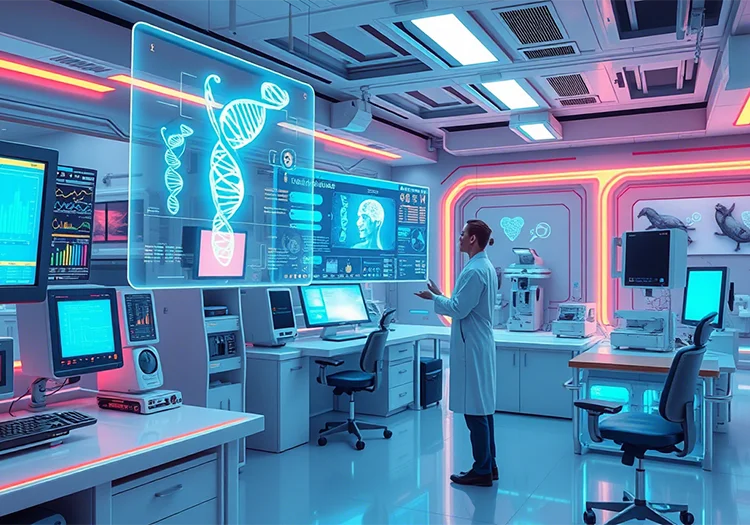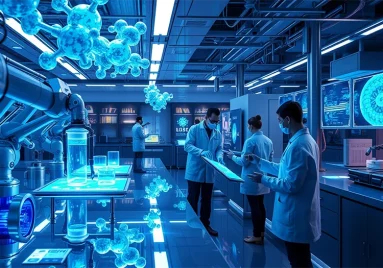Artificial Intelligence (AI) is transforming healthcare, making treatments more tailored and effective. Personalized medicine, powered by AI, is revolutionizing how doctors diagnose, treat, and monitor patients. This shift from a one-size-fits-all approach to individualized care improves outcomes, reduces side effects, and enhances overall patient well-being.
What is Personalized Medicine?
Personalized medicine, also known as precision medicine, is a healthcare approach that customizes treatments based on individual patient data. Unlike traditional medicine, which applies general treatments to all patients, personalized medicine considers genetic, environmental, and lifestyle factors to tailor therapies to each individual.
Role of AI in Personalized Medicine
AI plays a crucial role in analyzing vast amounts of patient data, identifying patterns, and making accurate predictions. By leveraging machine learning and deep learning algorithms, AI can help doctors make more informed decisions about treatment plans.
How AI Personalizes Treatments
Genetic Profiling and AI
AI analyzes genetic information to identify disease risks and suggest preventive measures. This helps doctors select treatments that match a patient’s genetic profile.
AI-Powered Drug Discovery
AI accelerates the drug discovery process by analyzing molecular structures, predicting drug interactions, and identifying potential treatments.
Real-Time Health Monitoring
AI-powered wearables and health monitoring devices collect real-time data, enabling doctors to adjust treatments dynamically.
AI in Disease Diagnosis
AI enhances early disease detection by analyzing medical images, blood tests, and patient history. AI-driven diagnostic tools, such as IBM Watson and Google DeepMind, can detect diseases like cancer, Alzheimer’s, and cardiovascular conditions more accurately than traditional methods.
AI-Powered Drug Development
Traditional drug development is costly and time-consuming. AI speeds up this process by predicting drug efficacy, identifying potential side effects, and optimizing clinical trials.
Benefits of AI in Personalized Medicine
- Improved Accuracy: AI reduces errors in diagnosis and treatment selection.
- Reduced Side Effects: Personalized treatments minimize adverse reactions.
- Cost-Effectiveness: AI-driven automation lowers healthcare costs by streamlining operations.
Challenges and Ethical Considerations
Data Privacy Concerns
AI relies on massive datasets, raising concerns about patient privacy and data security.
Bias in AI Models
AI algorithms can be biased if trained on non-representative datasets, leading to disparities in treatment recommendations.
Regulatory and Ethical Issues
Governments and healthcare organizations must establish regulations to ensure AI is used ethically and responsibly.
AI and Genomics: A Revolutionary Approach
AI helps interpret complex genetic data, predicting hereditary diseases and enabling early intervention.
AI in Patient Monitoring and Wearable Technology
AI-powered smart wearables track heart rate, blood pressure, and other health metrics, providing real-time insights for personalized care.
The Future of AI in Personalized Medicine
AI continues to evolve, with advancements in deep learning, neural networks, and robotics set to further personalize healthcare. The integration of AI with biotechnology promises even greater breakthroughs.
Case Studies of AI in Personalized Medicine
- IBM Watson in Oncology: Helps doctors create personalized cancer treatment plans.
- Google DeepMind in Eye Health: Detects eye diseases early using AI-powered imaging.
- Tempus in Precision Medicine: Uses AI to analyze genomic and clinical data for cancer treatment.
AI and Healthcare Professionals
AI enhances decision-making but does not replace doctors. Instead, it acts as an assistant, providing data-driven insights to improve patient care.
AI and Mental Health Treatments
AI-powered chatbots and predictive models assist in diagnosing and treating mental health conditions, providing personalized therapy recommendations.
Conclusion
AI is transforming personalized medicine, making treatments more precise, effective, and accessible. While challenges remain, AI’s potential to revolutionize healthcare is undeniable.
FAQs
1. How does AI contribute to personalized medicine?
AI analyzes patient data, predicts diseases, and tailors treatments to individual needs.
2. Can AI replace doctors in personalized medicine?
No, AI supports doctors by providing insights but cannot replace human expertise.
3. What are the risks of AI in healthcare?
Risks include data privacy concerns, biases in AI models, and ethical challenges.
4. How is AI used in genetic research?
AI helps analyze genetic data to identify disease risks and develop targeted treatments.
5. What is the future of AI in personalized medicine?
AI will continue to improve treatment accuracy, drug discovery, and patient monitoring, making healthcare more efficient and effective.
Please don’t forget to leave a review.






